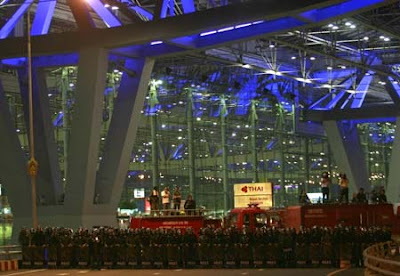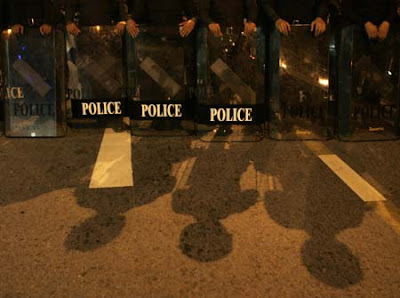Thousands of chanting protesters wearing yellow T-shirts and waving national flags have demonstrated on two consecutive days in what they say is an effort to topple the Thai government.
Analysts say it would be no easy job to end the years-long political turmoil that has been marked by accusations and unceasing protests and that the turbulence will cause Thailand's economy additional disturbances.
 Anti-government protesters gesture as they blocked the main road to Bangkok's Suvarnabhumi international airport November 25, 2008. Flight operations at Thailand's main international airport were disrupted on Tuesday night after hundreds of anti-government protesters stormed the terminal building.
Anti-government protesters gesture as they blocked the main road to Bangkok's Suvarnabhumi international airport November 25, 2008. Flight operations at Thailand's main international airport were disrupted on Tuesday night after hundreds of anti-government protesters stormed the terminal building.CEASELESS PROTESTS
Since late May, Bangkok has seen almost daily anti-government rallies led by the People's Alliance for Democracy (PAD) against two successive governments of the People's Power Party (PPP).
The protesters have branded the PPP leaders as puppets of former Prime Minister Thaksin Shinawatra, who was ousted in a 2006coup, and demand that they step down.
Samak Sundaravej, the predecessor of incumbent Prime Minister Somchai Wongsawat, was forced to resign in September for breaching the Thai Constitution by taking payments for appearing on television cooking shows.
However, Somchai's assumption of office apparently did not satisfy the opposition and demonstrations have not ebbed since.
Simmering tensions flared up again on Oct. 7, when police and anti-government protesters engaged in clashes that killed two people and injured 400 others.
The latest trouble came Tuesday when thousands of protesters swarmed Somchai's temporary headquarters at an abandoned airport in Bangkok.
The blockade marked the second day of what the PAD describes as a "final showdown" with the government in their campaign to oust the Somchai administration.
Chamlong Srimuang, the PAD core leader, has said the group is planning more intense protests and has vowed to topple the government by Wednesday.
 Police officers stand guard as anti-government protesters blocked the main road at Bangkok's Suvarnabhumi international airport November 25, 2008. Flight operations at Thailand's main international airport were disrupted on Tuesday night after hundreds of anti-government protesters stormed the terminal building.
Police officers stand guard as anti-government protesters blocked the main road at Bangkok's Suvarnabhumi international airport November 25, 2008. Flight operations at Thailand's main international airport were disrupted on Tuesday night after hundreds of anti-government protesters stormed the terminal building.DIM ECONOMIC GROWTH PROSPECTS
In addition to paralyzing the government, the turbulence would further shake Thailand's economy, which has been struggling amidst the ongoing global financial crisis.
Waves of scuffles, clashes and protests have paralyzed traffic and upset the services sectors, analysts say.
In the third quarter, Thailand's export-driven economy grew at its slowest pace in more than three years, the country's National Economic and Social Development Board (NESDB) has said.
The board said that major services sectors such as manufacturing, hotels and restaurants, transportation and communications have reported slow growth.
Thailand was at the center of the 1997 financial crisis that swept through most Southeast Asian markets and caused devastating economic damage.
Against the backdrop of the current global financial crisis, the worst since the 1930s, Thailand's economic growth would be dim partially because of social instability caused by the continuous protests.
 Police officers stand guard at Bangkok's Suvarnabhumi international airport as anti-government protesters block the main road November 25, 2008. Flight operations at Thailand's main international airport were disrupted on Tuesday night after hundreds of anti-government protesters stormed the terminal building.
Police officers stand guard at Bangkok's Suvarnabhumi international airport as anti-government protesters block the main road November 25, 2008. Flight operations at Thailand's main international airport were disrupted on Tuesday night after hundreds of anti-government protesters stormed the terminal building.IMMINENT SOLUTIONS POSSIBLE?
In rejecting opposition accusations, Somchai has said that he would not resign and that his government was elected democratically.
"The people are the ones who make decisions, because my government came from an election under the Constitution," the Thai News Agency quoted Somchai as saying.
"Anyone who wanted to overthrow or resist government is a rebellion."
Somchai also said that he would show the utmost restraint and hopes the stalemate could be ended through negotiations.
Meanwhile, rumors of a military coup to topple the government were dismissed Tuesday when Thailand's army chief Anupong Paojindaruled out that possibility.
Anupong said the armed services already had troops prepared to prevent anarchy or any kind of clashes.
Given the hawkish stance of both sides, with neither showing any tendency to concede, an imminent solution for the turbulence would be no easy job, analysts say.




No comments:
Post a Comment